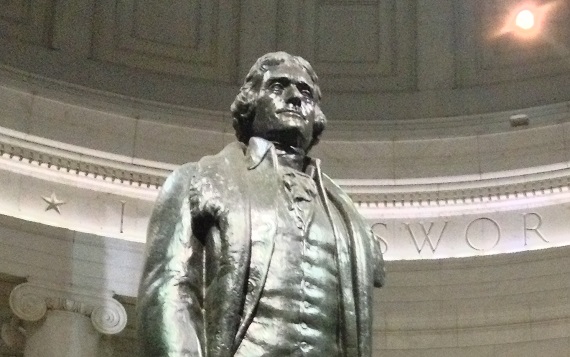
What separated the Jeffersonian understanding of government embraced by the South from the philosophy of Lincoln and the people of the North? For if Lincoln had believed as Jefferson, the war would not have happened. Indeed, it is probable that the circumstances leading up to the war would not have happened. So, what in fact, did happen?! Truth to tell, there were two philosophies of government or rather of the nature of man that undergirded North and South. The South held to the Aristotlean philosophy, later articulated by Locke, that Man was a communal being who naturally created groups in which to live. Within those groups government was necessary, but only to provide protection for the citizenry. The creed of this philosophy was voiced by Jefferson: “Government governs best that governs least.”
The other philosophy of government arose from the teachings of British philosopher Thomas Hobbes. Hobbes opined that man was not a communal being but rather, like the tiger, man was a solitary, making his way as best he could as a practitioner of the Law of the Jungle; that is, the survival of the fittest. Therefore, in order for man to be “civilized,” he had to be forced into a relationship with his fellows and that relationship could only be sustained through coercion. Naturally, the only means by which such coercion could be applied was government. Thus government was the means by which civilization and society were maintained. If there were no central government or if that government was weak and thus such coercion not efficacious, the result would be social and political chaos!
This was the philosophy of Abraham Lincoln and his political allies! Secession of the Southern states meant to Lincoln—besides the loss of revenue—the beginning of the breakup of what had been to that time an ever expanding Union. This, in turn, would lead to a weakening of central authority and, hence, anarchy, something which simply could not be permitted! Anything and everything needful to prevent that breakup was acceptable in light of the unmitigated disaster that would follow a weakening of the central authority and its ability to force a naturally unruly populace into submission! No act was too barbarous, no crime too egregious to be shunned if by its commission the Union was preserved. This mindset answers many questions about the Union strategy of total war and why the people of the North did not cavil or later repent of the commission of such atrocities because they were seen as “necessary.”
Of course, Lincoln as a Hobbesian was not talking about “union” as most men understood it then—or now for that matter. A true “union” is by its very nature voluntary. Union at the point of a gun is conquest, occupation and subjugation. Lincoln’s definition of “union” was the submission of the American people—North and South—to the will of the central government. And under that arrangement, the states became nothing more than “counties” within a national government. And as counties have no separate powers within their states, so states then have no separate powers within the central government but become bureaucratic entities used for the collection of revenues and the imposition of federal laws, mandates and regulations.
This is, in effect, what happened as a result of the war of 1861. Lincoln and Hobbes won. Aristotle, Locke—and Jefferson—lost and so did the vision of the Founders and We the People. Besides explaining how and why a ruinous war came about when sovereign states exercised their constitutional right to depart from a union that was no longer to their collective benefits, it also explains what is going on 150 years later as the same questions arise again as Jefferson Davis prophesied. Indeed, the major question remains: who rules—We the People or the Government?






